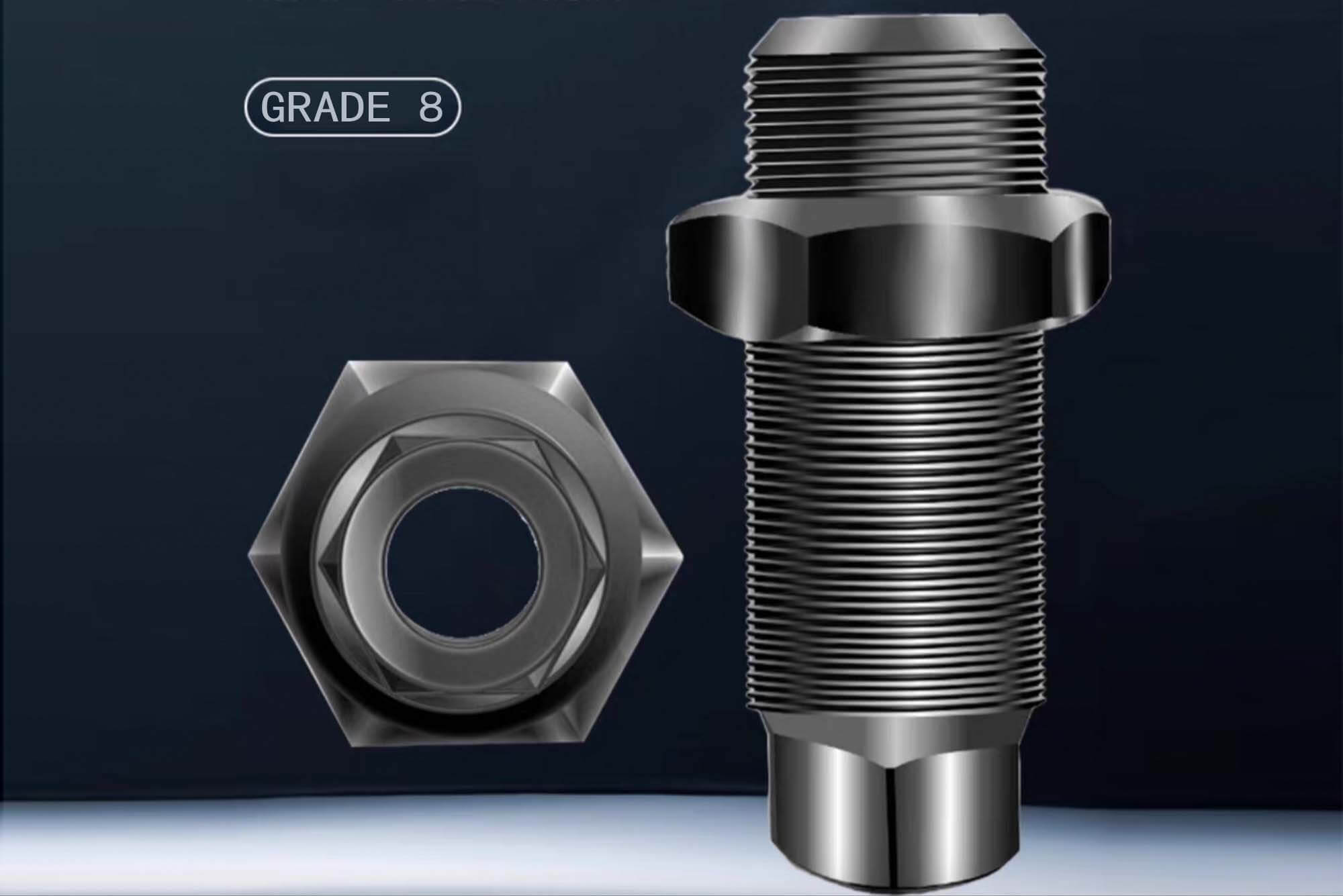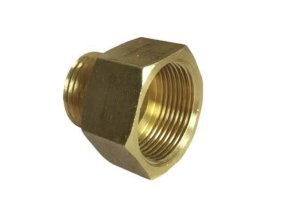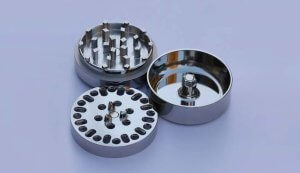Introduction
In the world of high-performance fasteners, Grade 8 bolts are a class apart. These bolts, made from medium-carbon alloy steel, are specially engineered to endure extreme stress, high torque, and challenging environmental conditions. With their exceptional tensile strength of 150,000 PSI, they are the go-to choice for industries that demand reliability, precision, and durability.
When I first encountered Grade 8 bolts, I was struck by how integral they are to ensuring safety in heavy-duty applications. During a machinery repair project, I saw firsthand how Grade 8 bolts, combined with CNC machining, could be customized to fit unique dimensions and handle precise torque requirements. This combination of strength and adaptability made a lasting impression on me.
In this article, we’ll delve into the key properties of Grade 8 bolts, their unmatched performance in various industries, and how CNC machining takes their utility to the next level. With the power of custom machining, these bolts can be precisely tailored to meet specific project requirements, offering unparalleled reliability. Whether you’re an engineer designing critical components or a contractor sourcing reliable fasteners, this guide will provide everything you need to know about Grade 8 bolts and their custom machining options.
Properties and Benefits of Grade 8 Bolts
2.1 Material Composition
The superior strength of Grade 8 bolts begins with their material: medium-carbon alloy steel, treated with a heat-quenching and tempering process. This enhances the steel’s structural integrity, enabling the bolts to resist deformation and breakage under high-stress conditions.
To further enhance their utility, these bolts often feature surface coatings such as:
- Zinc Plating: Adds a layer of corrosion resistance, ideal for outdoor or marine environments.
- Black Oxide: Reduces friction and adds aesthetic appeal.
- Cadmium Coating: Protects bolts in highly corrosive or chemical-heavy applications.
| Feature | Description | Benefits |
|---|---|---|
| Material | Medium-carbon alloy steel | High strength, wear resistance |
| Heat Treatment | Quenched and tempered | Enhanced durability, prevents brittleness |
| Surface Coating | Zinc, black oxide, cadmium | Corrosion resistance, reduced friction |
2.2 Tensile Strength
Grade 8 bolts are defined by their tensile strength, which measures the maximum load a material can withstand while being stretched. At 150,000 PSI, these bolts outperform most standard fasteners and are ideal for applications like:
- Automotive Assemblies: Secure engine mounts and suspensions that endure constant vibration and thermal expansion.
- Construction: Hold together critical structural components, including beams and trusses.
- Heavy Equipment: Withstand the load cycles of excavators, cranes, and industrial presses.
For comparison:
- Grade 5 bolts have a tensile strength of 120,000 PSI, suitable for medium-strength tasks.
- Grade 2 bolts are rated at 74,000 PSI and are limited to light-duty applications.
2.3 Durability
Durability is another hallmark of Grade 8 bolts. They excel in environments where wear, fatigue, and corrosion are constant threats. Thanks to their heat treatment, these bolts maintain their shape and integrity even after prolonged exposure to mechanical stress. This makes them invaluable in applications where failures could lead to catastrophic consequences.
Examples:
- Bridge Construction: Bolts resist constant load-bearing stress and environmental factors.
- Aerospace Applications: Withstand repeated high-speed vibrations during flight.
2.4 Comparison with Other Bolt Grades
Understanding how Grade 8 bolts compare to other common bolt grades highlights their advantages:
| Feature | Grade 8 Bolts | Grade 5 Bolts | Grade 2 Bolts |
|---|---|---|---|
| Material | Medium-carbon alloy steel | Medium-carbon steel, partially heat-treated | Low-carbon steel, no heat treatment |
| Tensile Strength | 150,000 PSI | 120,000 PSI | 74,000 PSI |
| Hardness (HRC) | 33–39 | 25–34 | Below 22 |
| Applications | High-stress environments | Moderate-strength uses | Low-stress applications |
| Durability | Excellent | Moderate | Low |
This comparison makes it clear why Grade 8 bolts are the go-to choice for heavy-duty tasks. While Grade 5 bolts are adequate for medium-strength applications, and Grade 2 bolts suit household uses, only Grade 8 bolts offer the reliability required for critical, high-stress environments.
2.5 Benefits of Custom Machining
The potential of Grade 8 bolts is further enhanced by custom machining, which allows these fasteners to meet specific industrial needs. By using CNC machining, manufacturers can:
- Create Precise Threads: Custom threading ensures bolts fit perfectly in non-standard assemblies, improving joint reliability.
- Design Specialized Heads: Adapt bolts to fit specific tools or applications, such as hex heads for aerospace or countersunk heads for automotive.
- Apply Advanced Coatings: Add layers like PTFE or powder coating for enhanced resistance to heat, chemicals, or abrasion.
For example:
- A construction company might need Grade 8 bolts with extended threads and galvanized coatings to withstand marine environments.
- An aerospace firm might require lightweight bolts with unique head shapes to minimize drag.
Custom Machining of Grade 8 Bolts
Custom machining takes Grade 8 bolts to the next level by adapting their properties to fit specific applications and industries. This section will explore why custom machining matters, the CNC processes involved, and the challenges and solutions in machining these high-strength bolts.
3.1 Why Custom Machining Matters
While standard Grade 8 bolts offer impressive strength and durability, many industries require bolts tailored to unique specifications. This is where CNC (Computer Numerical Control) machining becomes invaluable. CNC machining enables manufacturers to:
- Tailor Bolt Dimensions: Adjust length, diameter, and threading to match non-standard applications.
- Design Unique Heads: Create bolt heads that fit specialized tools or provide specific functional benefits.
- Enhance Durability: Add corrosion-resistant coatings or heat treatments for specific environments.
For instance:
- Automotive: A car manufacturer may need bolts with extended threads for specific suspension systems.
- Construction: Bridge projects often require extra-long bolts with galvanization to withstand marine climates.
3.2 Key CNC Machining Processes
CNC machining provides unparalleled precision for creating custom Grade 8 bolts. Here are the most common processes:
1. Thread Cutting
CNC machines can create custom threads with high accuracy, ensuring secure and reliable connections. This is crucial in industries like:
- Oil and Gas, where pipeline bolts must resist extreme pressure.
- Heavy Machinery, where bolts endure constant vibration and torque.
2. Head Shaping
Custom bolt heads are necessary for specialized tools and environments. Examples include:
- Hex Heads: Common in aerospace for compatibility with high-torque wrenches.
- Countersunk Heads: Used in automotive for flush-fitting applications.
3. Surface Finishing
Surface treatments applied via CNC ensure uniform coatings for improved performance:
- Zinc Plating: Resists corrosion in outdoor environments.
- PTFE Coating: Enhances chemical resistance for industrial applications.
| Process | Purpose | Example Application |
|---|---|---|
| Thread Cutting | Ensures precise and secure connections | Oil pipeline bolts |
| Head Shaping | Customizes bolts for specific tools | Aerospace panel fasteners |
| Surface Finishing | Adds durability and corrosion resistance | Offshore drilling platforms |
3.3 Challenges in Machining Grade 8 Bolts
Due to their material hardness and strength, machining Grade 8 bolts presents several challenges. However, CNC technology offers effective solutions:
| Challenge | Cause | Solution |
|---|---|---|
| Heat Generation | High cutting speeds on heat-treated steel | Use advanced cooling systems |
| Tool Wear | Abrasive medium-carbon alloy steel | Employ diamond-coated or carbide tools |
| Material Hardness | Resistance to deformation during machining | Optimize feed rates and cutting speeds |
By addressing these challenges, CNC machining ensures the precision and reliability of custom Grade 8 bolts, even for the most demanding applications.
Applications of Custom Grade 8 Bolts
Custom Grade 8 bolts are essential across various industries. Their adaptability through CNC machining allows them to meet specific requirements for strength, precision, and durability.
4.1 Automotive Industry
In the automotive world, Grade 8 bolts are indispensable for:
- Engine Mounts: Withstanding high torque and vibrations.
- Suspension Systems: Providing secure connections under dynamic loads.
- Chassis Assembly: Ensuring structural integrity in crash scenarios.
Example: A custom-machined Grade 8 bolt with extended threads and zinc coating was used in a racing car, preventing loosening during high-speed vibrations.
4.2 Construction
Construction projects demand fasteners that can handle immense loads and environmental exposure. Custom machining allows for:
- Extended Bolts: Suitable for large structural joints.
- Corrosion-Resistant Coatings: Protecting bolts in marine or humid environments.
Example: A bridge construction project required bolts treated with galvanized coatings and machined for extra length to secure steel beams.
4.3 Heavy Machinery
Heavy equipment like cranes, excavators, and loaders relies on Grade 8 bolts to connect high-load components. Custom machining ensures these bolts can endure:
- Dynamic Loads: Constant stress and vibrations.
- Unique Designs: Non-standard threads or head shapes for specialized tools.
4.4 Oil and Gas
In the oil and gas sector, bolts must resist extreme pressure and corrosion. CNC-machined Grade 8 bolts are often used for:
- Pipeline Assemblies: High-strength connections for transporting oil and gas.
- Offshore Platforms: Anti-corrosion coatings to withstand saltwater exposure.
Example: A custom-machined bolt with black oxide coating extended the lifespan of pipeline joints in a harsh offshore environment.
4.5 Aerospace
The aerospace industry values lightweight yet strong components. Custom bolts are used for:
- Aircraft Panels: Securely fastening panels with minimal weight.
- Engines: Providing precise connections that endure high-speed vibrations.
Cost and Efficiency Analysis
Custom machining of Grade 8 bolts is a sophisticated process that balances material quality, machining precision, and production efficiency. Understanding cost factors and optimizing production can help industries maximize the value of custom bolts.
5.1 Material and Machining Costs
The cost of Grade 8 bolts depends on several variables:
- Material Costs:
- Medium-Carbon Alloy Steel: The primary material for Grade 8 bolts is more expensive than lower-grade steel due to its strength and heat treatment.
- Coatings: Protective layers like zinc, black oxide, or PTFE add to material costs but significantly enhance durability.
- Machining Complexity:
- Custom threads, unique head shapes, and precise tolerances require more machining time and advanced tools.
- Surface finishing processes such as galvanization or powder coating further increase costs.
- Batch Size:
- Larger production runs reduce the per-unit cost due to economies of scale, as CNC setup costs are distributed over more units.
| Cost Factor | Impact on Cost |
|---|---|
| Material Quality | Higher for medium-carbon alloy steel |
| Coating Requirements | Adds to cost, especially for anti-corrosion coatings |
| Machining Complexity | Increases with custom dimensions or finishes |
| Batch Size | Larger runs lower the per-unit cost |
5.2 Cost Optimization Tips
Here are strategies to optimize costs when machining custom Grade 8 bolts:
- Bulk Orders: Ordering larger quantities reduces per-unit cost due to distributed setup expenses.
- Optimized CNC Programming: Efficient toolpaths and automated processes minimize machining time, saving on labor costs.
- Material Selection: Choose coatings or finishes based on application needs to avoid unnecessary expenses. For example, zinc coating may suffice for indoor use, whereas PTFE is essential for chemical-heavy environments.
Case Studies
6.1 Heavy Equipment: Custom Bolts for Cranes
Challenge: A crane manufacturer needed custom Grade 8 bolts to secure the boom sections, which endure heavy dynamic loads. The bolts required extended threads and corrosion resistance.
Solution: CNC machining created bolts with precise threading and a zinc coating to withstand outdoor conditions.
Result: The custom bolts improved operational safety and extended maintenance intervals by 25%.
6.2 Automotive: High-Torque Suspension Bolts
Challenge: A performance car manufacturer required bolts for a new suspension system capable of handling extreme torque without loosening.
Solution: Custom Grade 8 bolts were machined with specific head shapes and thread patterns for maximum stability.
Result: The bolts improved suspension performance, reducing vibration issues by 30%.
6.3 Oil and Gas: Corrosion-Resistant Pipeline Bolts
Challenge: Offshore pipelines required bolts that could endure high pressure and resist saltwater corrosion.
Solution: CNC machining was used to create custom Grade 8 bolts coated with black oxide for maximum corrosion protection.
Result: The lifespan of pipeline joints increased by 40%, reducing maintenance costs significantly.
Conclusion
Grade 8 bolts, when paired with custom machining, offer unparalleled strength, precision, and durability. Whether it’s securing high-torque automotive components, holding together structural elements in construction, or withstanding the harsh conditions of offshore drilling, custom-machined Grade 8 bolts provide the reliability industries demand. By investing in CNC customization, you ensure that every bolt meets the exact specifications needed for the most critical applications.
FAQ
1. What makes Grade 8 bolts different from other grades?
Grade 8 bolts are made from medium-carbon alloy steel, offering superior strength (150,000 PSI) and durability compared to lower grades like Grade 5 (120,000 PSI) and Grade 2 (74,000 PSI).
2. How does custom machining enhance Grade 8 bolts?
CNC machining allows for precise adjustments, such as custom threading, unique head designs, and advanced surface coatings, to meet specific industrial needs.
3. Are Grade 8 bolts suitable for high-temperature environments?
Yes, Grade 8 bolts can withstand high temperatures due to their heat-treated construction. Additional coatings can further enhance performance in extreme environments.
4. What coatings are available for Grade 8 bolts?
Common coatings include zinc for corrosion resistance, black oxide for reduced friction, and PTFE for chemical resistance.
5. How do CNC-machined bolts compare to standard bolts in cost?
Custom bolts are more expensive due to machining time and materials, but bulk orders and optimized programming can reduce costs.
6. Can Grade 8 bolts be customized for non-standard dimensions?
Yes, CNC machining enables custom lengths, diameters, and threading to fit unique applications.
7. What industries use Grade 8 bolts the most?
Industries like automotive, construction, heavy machinery, oil and gas, and aerospace heavily rely on Grade 8 bolts.
8. How does CNC machining prevent thread misalignment?
CNC machines use precise control to ensure threading is perfectly aligned, reducing the risk of failure during operation.
9. Are there eco-friendly options for machining Grade 8 bolts?
Yes, manufacturers can use eco-friendly coatings and optimize CNC processes to minimize waste.
10. What certifications are required for Grade 8 bolts?
Grade 8 bolts must meet standards like SAE J429, ensuring they meet tensile strength and durability requirements.
11. Can Grade 8 bolts be reused after disassembly?
While reusability depends on the application and condition, bolts used in critical environments should generally be replaced.
12. How do I choose the right bolt coating?
Consider the environment: zinc for outdoor use, PTFE for chemical resistance, and black oxide for indoor or aesthetic purposes.
13. What tools are best for machining Grade 8 bolts?
Diamond-coated or carbide tools are ideal for handling the hardness of medium-carbon alloy steel.
14. What is the lifespan of Grade 8 bolts in high-stress environments?
With proper installation and maintenance, Grade 8 bolts can last decades, depending on the application.
15. Where can I find reliable suppliers for CNC-machined Grade 8 bolts?
Look for manufacturers with expertise in CNC machining and a proven track record in custom fasteners.
Other Articles You Might Enjoy
- Maximizing Strength and Durability: Custom CNC Anchor Bolts for Structural Applications
Introduction Anchor bolts are an integral part of modern construction, serving as the foundation for structures ranging from residential buildings to massive infrastructure projects like bridges, towers, and offshore platforms.…
- Lag Bolts Specifications and Materials: Choosing or Machining the Right Lag Bolt for Your Project
Introduction Overview of Lag Bolts: What They Are and Common Applications Lag bolts are among the most reliable fasteners used in construction, furniture manufacturing, heavy machinery assembly, and many other…
- Crafting Custom Bolts with CNC Machining and Exploring Screw Innovation
The precision and reliability of custom bolts are critical in industries such as aerospace, automotive, and construction. With the increasing complexity of modern engineering, standard bolts and screws are no…
- Machining Techniques for Parts: Unlocking CNC and Cutting-Edge Tech
I. Introduction I remember the first time I realized how critical machining is to modern manufacturing. I was interning at a small shop, watching a CNC machine carve intricate features…
- Using Acrylic in CNC Machining: Does It Offer Clear Advantages?
Introduction to CNC Machining and Acrylic CNC machining, an abbreviation for Computer Numerical Control, is a process utilized broadly in manufacturing where pre-programmed computer software directs the movement of factory…
- Custom CNC Machining Solutions for Aerospace Instrumentation
Introduction to CNC Machining in Aerospace Instrumentation In the modern era, Custom Numerical Control (CNC) machining has emerged as a pivotal capability in the aerospace industry. Pioneering advancements in technology…
- Custom Precision CNC Machining Services for Bronze Parts
Introduction to CNC machining and Bronze Parts Manufacturing Custom precision Computer Numerical Control (CNC) machining is a unique technology that employs computerized controls and machine tools to eradicate layers of…









